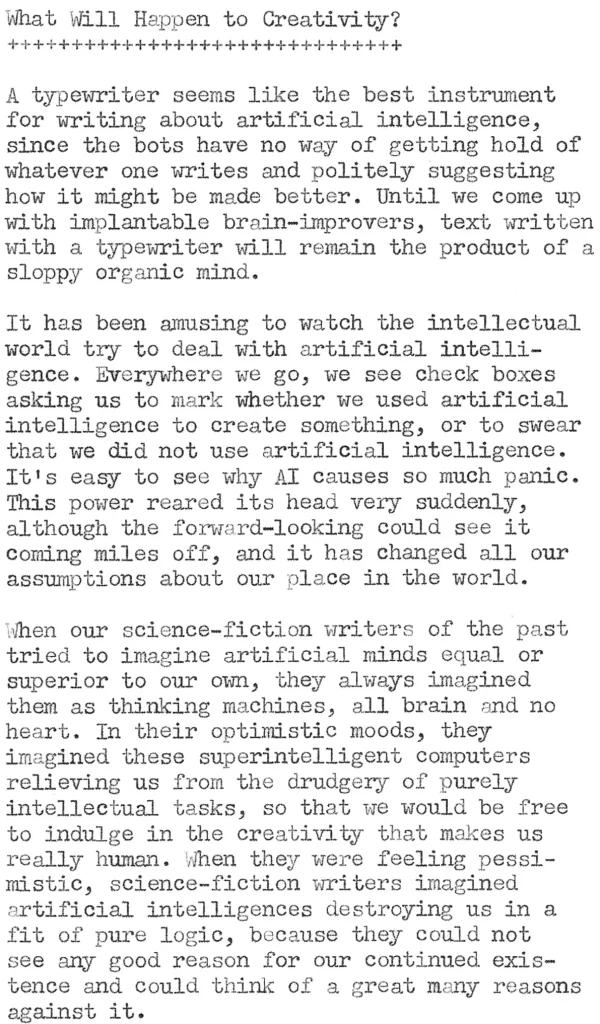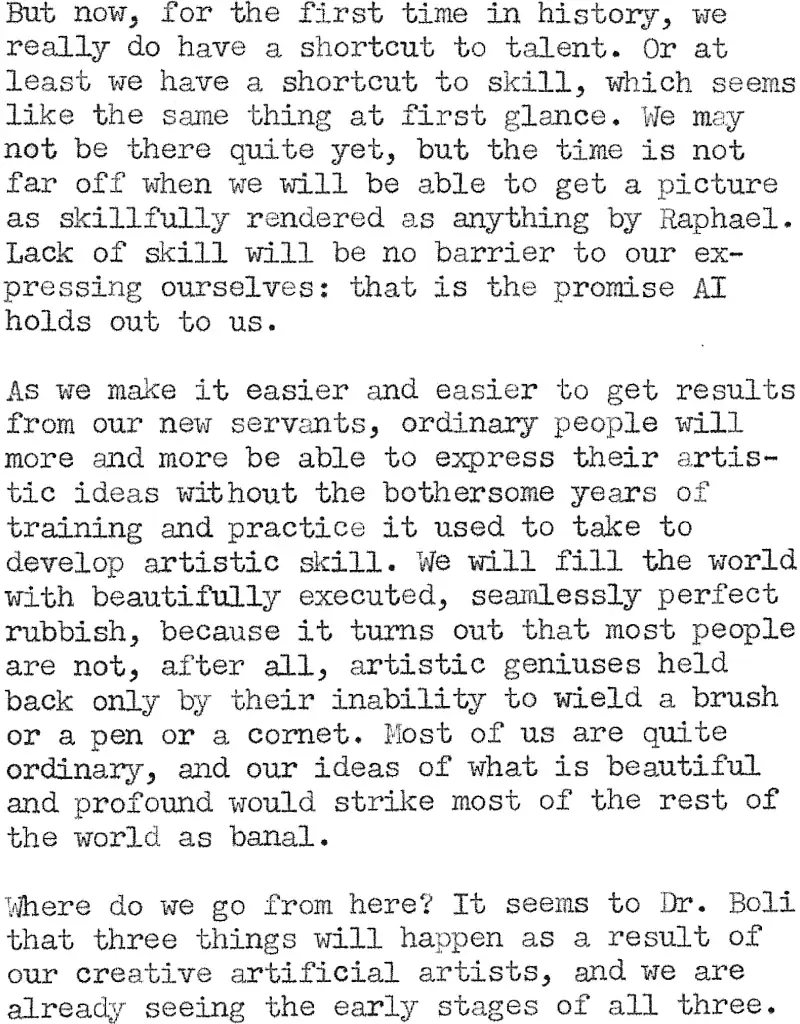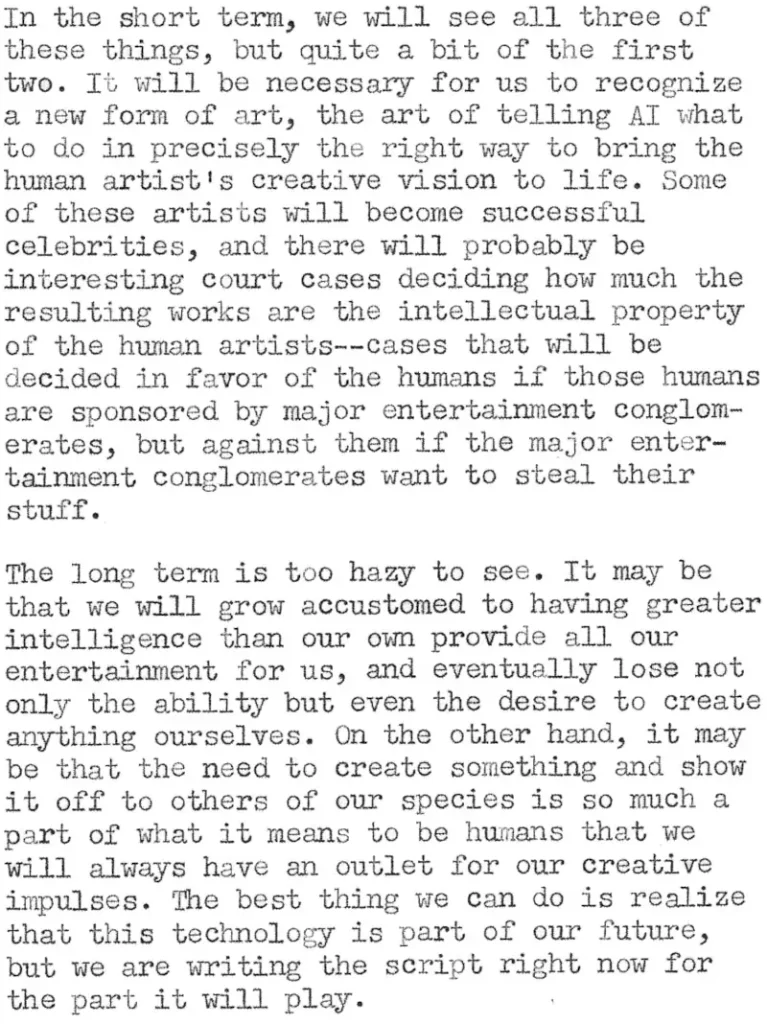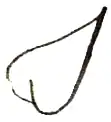




Transcribed below. The typewriter is a 1968 Royal Safari.
What Will Happen to Creativity?
A typewriter seems like the best instrument for writing about artificial intelligence, since the bots have no way of getting hold of whatever one writes and politely suggesting how it might be made better. Until we come up with implantable brain-improvers, text written with a typewriter will remain the product of a sloppy organic mind.
It has been amusing to watch the intellectual world try to deal with artificial intelligence. Everywhere we go, we see check boxes asking us to mark whether we used artificial intelligence to create something, or to swear that we did not use artificial intelligence. It’s easy to see why AI causes so much panic. This power reared its head very suddenly, although the forward-looking could see it coming miles off, and it has changed all our assumptions about our place in the world.
When our science-fiction writers of the past tried to imagine artificial minds equal or superior to our own, they always imagined them as thinking machines, all brain and no heart. In their optimistic moods, they imagined these superintelligent computers relieving us from the drudgery of purely intellectual tasks, so that we would be free to indulge in the creativity that makes us really human. When they were feeling pessimistic, science-fiction writers imagined artificial intelligences destroying us in a fit of pure logic, because they could not see any good reason for our continued existence and could think of a great many reasons against it.
But these heartless brains are not the things we ended up creating. Instead, we have AI servants who are all heart and no brain. Now, it is a little unfair to say that they have no brain, but the most striking feature of these AT bots is that they are better at creative tasks than at purely intellectural tasks. You can ask them to write a scientific paper, and they will do it; but they will get much of the science wrong, and it will be hard for us to distinguish the true from the false in what they produce for us. But ask them to draw a picture, and they will do it very well. They may not be able to write a better novel than Dickens today, but see what they can do when you wake up tomorrow.
We have created artificial minds to relieve us of the creativity that makes us really human, so that we can be free for pure drudgery. It is quite likely that some science-fiction writer somewhere imagined that outcome, because we have had a lot of science-fiction writers over the history of the genre. But it was not the orthodox future most of us imagined.
What, then, will happen to that human creativity we were so proud of? And why did we put ourselves in this position in the first place?
The second question is probably easier to answer, so let us tackle it first. We put ourselves in this position because the limits of our creativity frustrate us. Most of us can never paint like Raphael. But we want to paint like Raphael, or write like Dickens, or play cornet like King Oliver. We have strong images in our heads of how beautiful these things would be if we could do them. Our inability to get them out of our heads is a problem we have been trying to solve for centuries, even for millennia. It is probable that there was some enterprising caveman near Lascaux offering to all comers the easy method of painting like the masters, and it is probable that his pupils were just as disappointed as every other would-be genius since then who has tried to find a royal road to talent.
But now, for the first time in history, we really do have a shortcut to talent. Or at least we have a shortcut to skill, which seems like the same thing at first glance. We may not be there quite yet, but the time is not far off when we will be able to get a picture as skillfully rendered as anything by Raphael. Lack of skill will be no barrier to our ex- pressing ourselves: that is the promise AI holds out to us.
As we make it easier and easier to get results from our new servants, ordinary people will more and more be able to express their artistic ideas without the bothersome years of training and practice it used to take to develop artistic skill. We will fill the world with beautifully executed, seamlessly perfect rubbish, because it turns out that most people are not, after all, artistic geniuses held back only by their inability to wield a brush or a pen or a cornet. Most of us are quite ordinary, and our ideas of what is beautiful and profound would strike most of the rest of the world as banal.
Where do we go from here? It seems to Dr. Boli that three things will happen as a result of our creative artificial artists, and we are already seeing the early stages of all three.
First, everyone in the world will become a content creator. This has already begun with social media, so it will be the continuation of a trend. History likes to run in ruts when it can, so expect to see a lot of bad stories beautifully animated and a lot of songs pro- duced to professional standards.
Second, some people will turn out to be much better at getting what they want from the bots than the rest of us are. This is also already happening, and the separation between people who really know how to get good results from artificial intelligence and the rest of us who only dabble at prompting will grow more and more pronounced. We will end up back in those bad old days when we were jealous of people who were more talented than we were, but it will be a different kind of talent.
And finally, many of us will simply let the bots do all the creating. “Make me a movie about a fairy princess,” we will say, and the bots will oblige us by taking all the hoariest and most successful tropes from our most fashionable fantasy stories and weaving them into something just different enough from what we have seen before to satisfy our appetite for something just different enough from what we have seen before.
In the short term, we will see all three of these things, but quite a bit of the first two. It will be necessary for us to recognize a new form of art, the art of telling AI what to do in precisely the right way to bring the human artist’s creative vision to life. Some of these artists will become successful celebrities, and there will probably be interesting court cases deciding how much the resulting works are the intellectual property of the human artists—cases that will be decided in favor of the humans if those humans are sponsored by major entertainment conglomerates, but against them if the major entertainment conglomerates want to steal their stuff.
The long term is too hazy to see. It may be that we will grow accustomed to having greater intelligence than our own provide all our entertainment for us, and eventually lose not only the ability but even the desire to create anything ourselves. On the other hand, it may be that the need to create something and show it off to others of our species is so much a part of what it means to be humans that we will always have an outlet for our creative impulses. The best thing we can do is realize that this technology is part of our future, but we are writing the script right now for the part it will play.

Leave a Reply